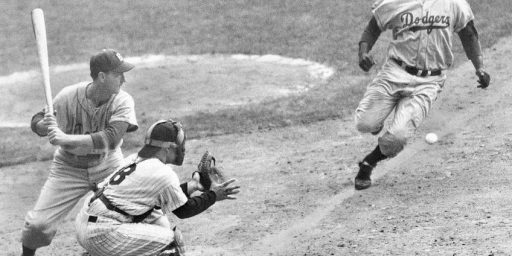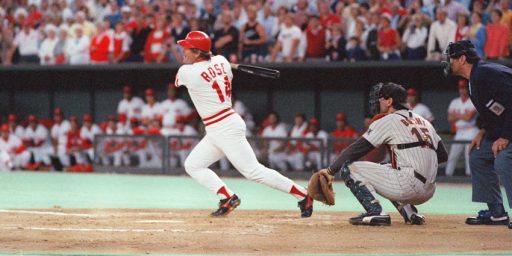Parity in Professional Sports
Dan Wetzel argues that, conventional wisdom to the contrary, Major League Baseball, despite wild disparities in team salary, has far more parity than the National Football League and National Basketball Association do with their salary caps and revenue sharing.
MLB will crown its seventh different World Series champion in seven years, either Detroit or St. Louis joining the Chicago White Sox, Boston Red Sox, Florida Marlins, (then) Anaheim Angels, Arizona Diamondbacks and Yankees as winners this decade. Even more telling, the Tigers are the 11th different team (out of a possible 14) to reach the World Series during that time.
In comparison, the NFL, with its hard salary cap and “any given Sunday” motto, has crowned just five different champions the past seven years and also seen 11 different teams reach the Super Bowl. The NBA, which also boasts the kind of salary cap seemingly everyone claims baseball desperately needs, has seen just four teams win the title in the past seven years. Just eight teams have reached the NBA Finals during that stretch.
Making the MLB numbers even more impressive is the fact that baseball invites just eight of its 30 teams (26.6 percent) to the postseason. The NFL lets in 12 of 32 (37.5 percent) and the NBA goes with 16 of 30 (53.3 percent), which increases the likelihood of upset-driven diversity in the late rounds.
There is little question that big-market teams with big payrolls have an advantage in fielding a championship-caliber club; obviously, the Yankees have a better chance than the Tampa Bay Devil Rays. But baseball is a different kind of game, and stockpiling talent isn’t enough — as the Yankees’ six-year World Series drought has proven.
[…]
Baseball is a game where the highest-paid player, the Yankees’ Alex Rodriguez ($25 million in 2006), can bat .071 against the Tigers. It is a sport where even the best player only gets up every few innings and the top starting pitcher can only go every fourth day, at best. It is basketball where a player can have an effect at both ends of the court on every single play. It is football where a player can impact at least half of the action.
In baseball, you can’t win without a team — a deep, clutch, close-knit, total team. And you just can’t buy that.
From 1991 through 2005, the Atlanta Braves won their division every year (with an asterisk for the strike-shortened 1994 season, when they were trailing the Montreal Expos but MLB awarded the penants to the team that had won the previous year). They had three Hall of Fame candidates, Greg Maddux, Tom Glavine, and John Smoltz in their pitching rotation simultaneoulsy for most of that stretch. Yet, they won only a single World Series. By contrast, the 1992 expansion Florida Marlins never won a single division title, had losing seasons almost every year, and won two championships.
That’s not so much parity, though, but the nature of the game. In football and basketball, the better team almost always wins. In baseball, even the most dominant teams lose a third of their games. That’s because, as Wetzel notes, a single player can have a major impact every game.
By contrast, baseball is mostly about dominating starting pitching. Since a starter generally only pitches every fifth day, the dynamics are very different from one game to the next. The left hand/right hand thing matters a whole lot more with pitching and hitting, too. Hitters go through hot streaks and slumps in a way that quarterbacks and power forwards don’t.
This is a major reason why baseball experts agree that winning a World Series is partly about luck. A single football game is generally a pretty good test of which team is better, barring a freak injury to the quarterback. A best of seven series in basketball is virtually never won by the inferior team. That’s because a Joe Montana or a Michael Jordan aren’t sitting on the bench in the final minutes of a close game. Barring injury to Tom Brady, the New England Patriots would never start the quarterbacking equivalent of Oliver Perez in the AFC Championship game.
A great regular season baseball team is built around steady production on hitting and defense and a deep pitching rotation. In a 162 game grind, with maybe five or six days off a month, we get a pretty good idea who the best teams are in each league. In the playoffs, though, a team can ride two hot starting pitchers to a championship (see the Arizona Diamondbacks).
Regardless, however, “parity” isn’t so much a measure of which teams win the championship but which ones have a chance to compete. The only way the Kansas City Royals will ever go to another World Series under the current system is to either start spending a whole lot more money or have extraordinarily good luck in developing talent. By contrast, the New York Yankees can essentially buy themselves a ticket to the playoffs every year. That they’ve invested too much in aging superstars past their prime isn’t a testament to parity but bad management.






Baseball’s long season also makes for unpredictability. Injuries, losing streaks, all those intangibles add it. Playing 162 games is much tougher than a 16 game NFL schedule. Look at the Mets this season. They led the NL East from the third day of the season till the end. Didn’t help them against the resurgent Cardinals, who barely played .500 ball during the season.
“By contrast, the 1992 expansion Florida Marlins never won a single division title, had losing seasons almost every year, and won two championships.”
One of those years, they bought their way to the title. (Briefly had a Braves-level payroll, in other words).
M1EK: True enough for the first team in 1997. Of course, the Braves have had a pretty mediocre payroll since Ted Turner sold off the team.
Why pick seven years to make the argument? Could it be that the data doesn’t really support the argument if we pick a slightly larger sample size? This seems like cherrry picking statistics in support of a conclusion.
Shayes is going to get them on steroids again, but that plane crashed……..
Charles Austin: I think the 7 year snapshot is primarily about how the wild card has affected baseball’s post-season since it was instituted.
Even though my Mets got beat fair and square, I’m thoroughly in favor of the wild card, and one only has to look at the Tigers to strengthen the case. The Twins beat Detroit for the Division title by one game, yet the Tigers were clearly the better team for most of the season. The playoffs would’ve been a joke without them, and they’re probably going to eat the Cards a new sphincter.
With 8 teams in playoff baseball, all 8 have to be assumed to be talented. My theory is that a wild card team is hungrier, with something more to prove. That’s an element that stats can’t quantify.
Go Detroit–good for them, good for their city.
Major league Baseball, Football and Basketball is nothing more than an overpaid bunch of pre madonnas that are not the “Idols of American Youth” they make themselves out to be.
Anyone who is a “Fan” of these so called sports is proof that P.T. Barnum was right.
I think you mean do a better job developing and evaluating talent. If you look at the Marlins, A’s and Twins they seem to have been successful either witht heir own homegrown players or trading for prospects. The Pirates and Royals don’t seem to be able to do either.
Bandit: Right. Doing those things incredibly well can transform any franchise into a winner. The problem is that poor teams have much less room for error than rich ones, which can compensate for mistakes by buying free agents. The Yankees’ run in the late 1990s-early 2000s was based on doing a great job developing a core group of homegrown players and supplementing that with free agent acquisitions.
The Kansas City Royals couldn’t have held onto Jeter, Williams, Rivera and company so would have to keep catching lightning in a bottle. So rich teams not only get to capitalize longer on their success but can cover up for it by paying for great finds other teams can’t afford.
OK – Who did the Royals get in return for Jermaine Dye, Johnny Damon, Mike Sweeney (who they didn’t trade) and Carlos Beltran and why did they sign Grudzelenik and Mientkiewicz (except to draw big in the Polish community) and Reggie Sanders and why do Angel Berroa, Andy Sisco, Runelvis Hernandez, Ambiorix Burgos and the departed Jeremy Affeldt just suck beyond belief? It’s not just luck. Having Bo Jackson hurt his hip and end his career was bad luck. Never producing players who can contribute and not being able to get prospects who can play is poor development and evaluation.